Buying a SIM Card or eSIM in Czechia
We may earn a commission from purchases you make after clicking links on this site. Learn more.Whether you call the country Czechia or the Czech Republic, you’re right either way. In 2016 the country’s government decided it would be good to have a one-word name for the country, and officially changed the “short” name of the country to Czechia.
It hasn’t really caught on yet, though, and many locals and tourists still call it the Czech Republic, at least in English.
I spent a month in Prague, the country’s capital and largest city. It’s full of amazing food, incredible architecture, great co-working spaces, and solid, if not particularly cheap, mobile providers.
You may well find that a travel eSIM is not only an easier way of staying connected, it’s a similar price as well. However you choose to do it, here’s what you need to know.
Companies
Unlike many other European countries, you won’t be bombarded with tons of marketing from carriers when you land, or even as you walk the streets of Prague.
Sure there are stores and kiosks everywhere throughout the city, but it’s refreshing not to be overwhelmed by them all telling you they are the biggest, fastest, best value, etc. as you wander around.
There are three big players in Czechia: Vodafone, T-Mobile, and O2, and I initially wasn’t sure which to go with. All three offer LTE coverage on pre-paid plans, but my research as to the best option gave mixed results.
I started by asking other digital nomads at the co-working space I favored, but learned nothing conclusive. Everyone had a different favorite, mostly based on which company had the best special when they first landed in town.
I also checked their phones, but all had strong signal and good speeds in the city center regardless of network.
Need travel insurance for Czechia?
Need travel insurance for Czechia?
Additional online research turned up the same thing, with several people suggesting the providers were all comparable. Finally, I decided to just go into the stores and get more info firsthand.
Staff at both O2 and T-Mobile told me they had the best network, just because “they were the best”. They offered no differentiation or explanation as to why, and seemed to think it was an odd question.
I then visited the Vodafone shop, and was impressed. Not only was there no wait to talk to someone, but the salesperson explained his answer very articulately by showing me a map of all of the countries in Europe where Vodafone operates, and how their roaming packages have better pricing and coverage.
He then ran a speed test on his phone to show me the lightning-fast LTE speeds of the network (more below). Lastly, he showed me the prepaid package options, which were more numerous than either of the other two carriers. I was sold.
Vodafone was the clear winner for me, and after using it for a few weeks, I wasn’t disappointed.
Travel eSIM for Czechia
While speeds and coverage with physical SIM cards are generally good in Czechia, I can’t really say the same for prices. They won’t break the bank, but compared to other nearby prices, they’re somewhat expensive.
With that in mind, you may find it’s cheaper (and easier) to use a travel eSIM instead. Prices are reasonable whether you need a small amount of data or a lot, especially if you go with Nomad.
Of the companies I’ve personally used and would be happy to recommend, it has the best prices and greatest number of options in Czechia. Like most travel eSIMs, it’s data-only: you don’t get a local number.
I use apps for everything from communication to transport these days, so the lack of a local number very rarely matters to me, but you might have different needs.
One thing worth noting: if you’re planning to travel to several European countries within a few weeks, it might be worth looking at some of the regional eSIM packages on offer.
There are too many to list each one separately (and they change all the time), but as a starting point, these are the Europe eSIM options from companies I’d actually consider using:
- aloSIM (34 countries)
- Airalo (39 countries)
- Nomad (30-35 countries)
- SIMOptions (29-39 countries)
- yeSIM (31 countries)
- easySIM (36 countries – free with any single-country eSIM)
If you’re new to eSIMs, they offer big benefits to travelers in terms of how quickly, easily, and (often) cheaply you can get connected when you arrive in a new country. Most recent phones support them, and you can read all about them here.
How to Buy a Prepaid SIM Card in Czechia
While Vodafone has a kiosk in Terminal 2 of Prague’s international airport, as mentioned I waited until I was in the city and visited all three carriers. O2 and T-Mobile used a touchscreen ticket system, with a 15-minute wait in both cases. When I finally did get to talk with someone, I felt more like an annoyance than a customer.
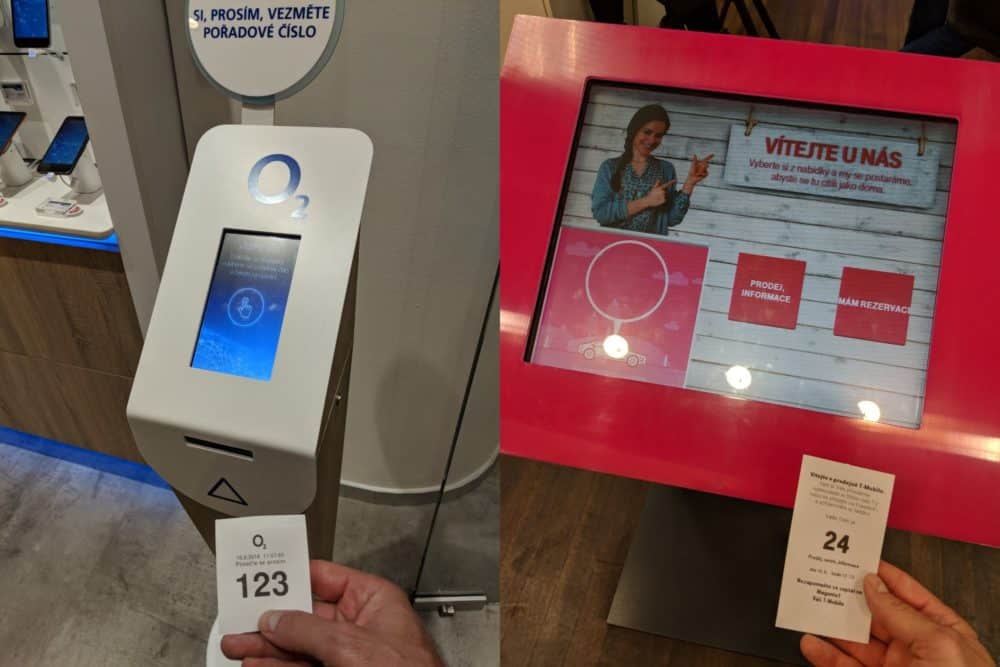
Vodafone had no visible ticket system, with plenty of knowledgeable staff on hand to answer my questions right away. Even with the carrier overview and package selection, the entire process took only 15 minutes.
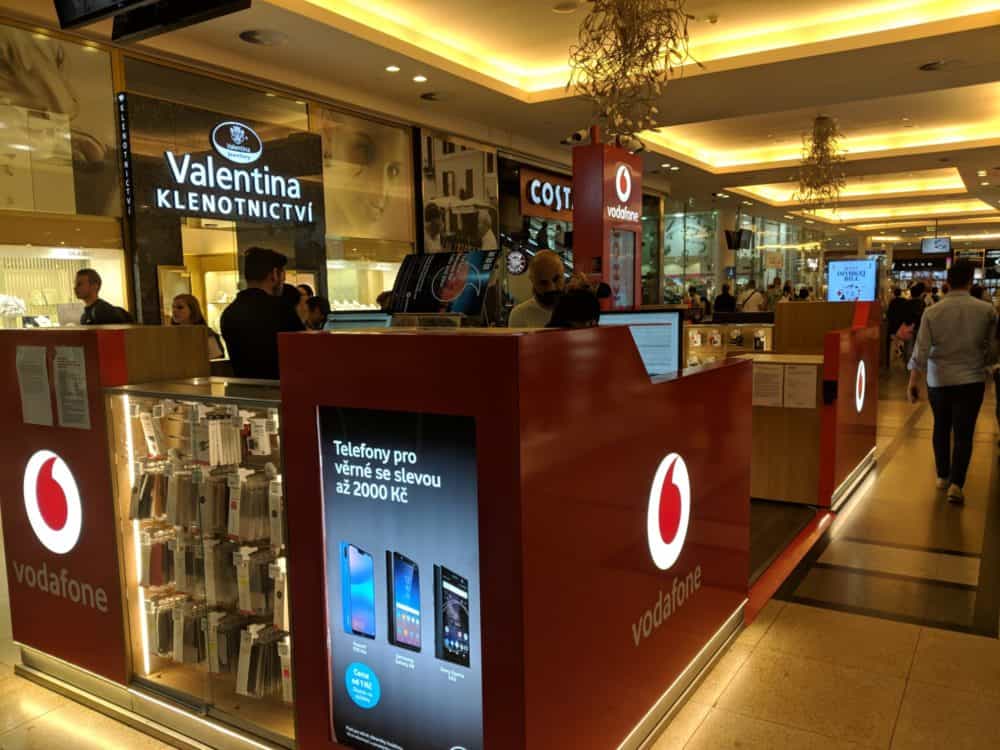
No passport was even required for the transaction. I just had to select my plan, sign a form written in Czech that said I wouldn’t do anything illegal with my SIM, and pay.
The representative installed the card for me and made sure it was working before I left. It was a breeze.
Prepaid SIM and eSIM Costs
O2 was running a special at the time, making it slightly cheaper than the other providers, while T-Mobile had a different but comparable offering to Vodafone.
All three companies matched each other well on prices, and I was told they all tweak their plans a little each month to stay competitive. Unsurprisingly, perhaps, none had printed price sheets.
The Vodafone SIM card was free with the purchase of my plan, and I went for a tourist-focused package that included 15GB of data for 499 Czech Koruna (~$23), good for 30 days. This also included unlimited texts for the first month, but no calls.
There was also a 20GB option for 649 CZK, again for 30 days. That one included unlimited calls within the Czech Vodafone network and 130 minutes to other local networks, but no texts. You can add credit to either pack to cover calls/texts as needed.
These packages didn’t include EU roaming. I was in Czechia for the full month so roaming wasn’t something I needed, but you’ll need to go for a different package (or provider) if that’s something you’re after.
Nomad
As I mentioned above, of the better eSIM companies, Nomad has the best pricing for useful data packages in Czechia. It’s roughly the same as what you’ll pay for the same amount of data with a local SIM card, without having to go find and install one.
It’s not the only game in town, of course (as you can tell by the number of eSIM companies offering Europe-wide packs that I mentioned earlier!). We’ve compared many of them in the past: here’s how the best ones stack up price-wise in Czechia.
Topping Up
Vodafone
With 15 gigs to use in a month and a fast Wi-Fi connection at my co-working spot, I never had to top up, but it’s easy enough to do.
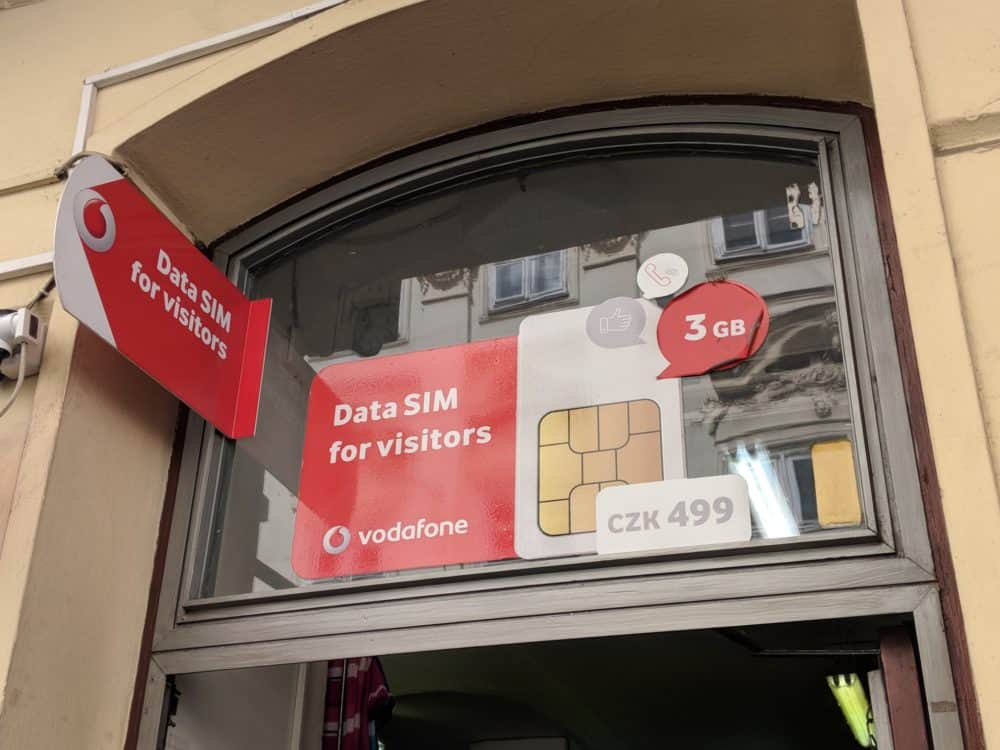
Options include the Vodafone app (Můj Vodafone), the company website, or any place around town that has a Vodafone sticker in the window (and there are a lot of them).
Nomad
Topping up with Nomad (or any of the other travel eSIM companies) is done by logging into the website or app. You just select your Czechia eSIM, hit the top-up button, and buy the same package again.
The top-up packs have exactly the same pricing and duration as the original eSIMs: there’s little difference between topping up your current eSIM and buying a new one, other than not having to activate it.
Get regular updates from the world of travel tech and remote work
News, reviews, recommendations and more, from here and around the web
Coverage and Data Speeds
As soon as I bought my SIM card, I noticed how fast web browsing and internet-based apps seemed to be… and then I tested the speed.
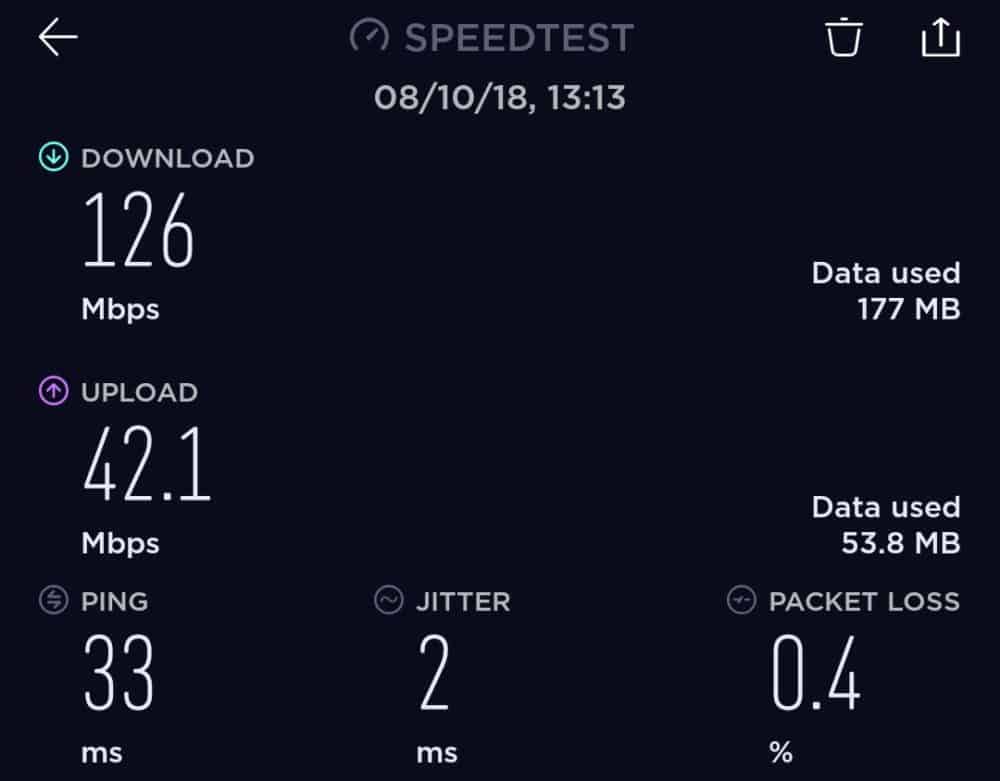
126Mbps down/42Mbps up! Those speeds remained consistent during my entire trip, and I had no issues with the service anywhere I used my phone.
Nomad also uses the Vodafone network, and even better, can also use the O2 network when it needs to. Let’s just say you’re unlikely to have problems with coverage or speed in Czechia!
EU Roaming
Czechia is part of the European Union, so EU roaming regulations apply. These “roam like at home” rules ended roaming charges across much of Europe in 2017, letting you use a SIM card from any EU country across all the others at no extra charge.
There are some exceptions and limits, however, especially with large data packages like the tourist plan mentioned above. We’ve also had reports of Vodafone staff at the airport refusing to enable roaming on other plans for foreign visitors (see the comments below).
In short, double-check the exact details carefully at time of purchase if you plan to roam elsewhere in the EU, or just use one of the travel eSIMs I mentioned earlier instead.
Check out our guides to SIM cards and eSIMs in 70+ other countries here.


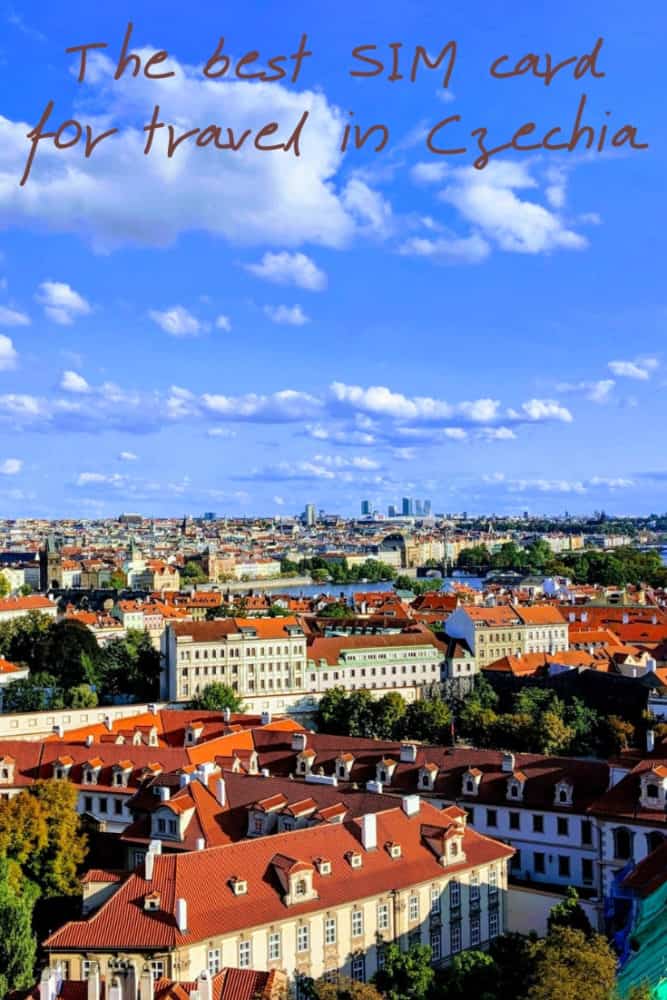

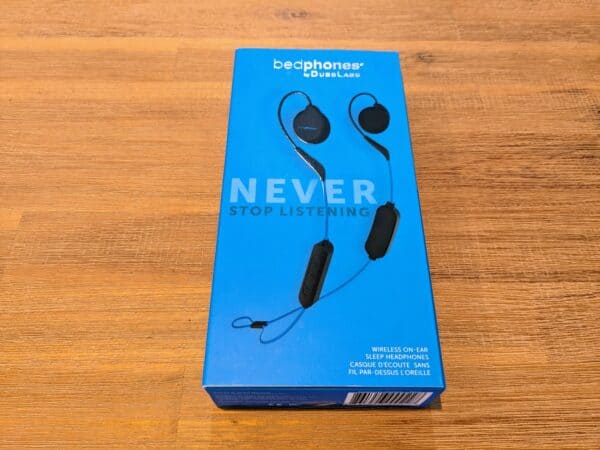

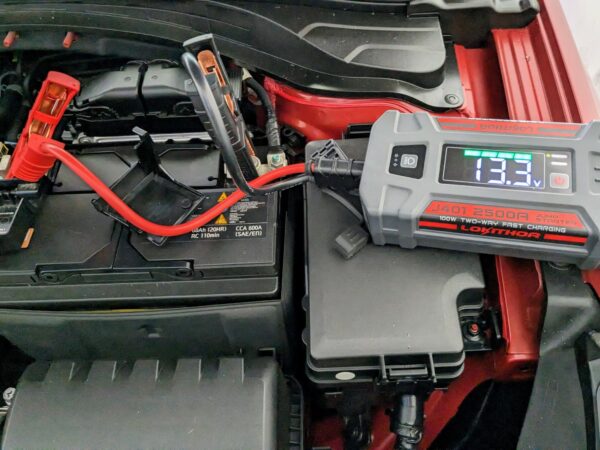


Very useful article, thanks a million!
I will be studying abroad in Prague in September and this article was very helpful! Did you happen to travel outside the Czech Republic? I’ll be visiting lots of Eastern European countries during my weekends and I was curious how roaming worked for you (if you did travel).
From what I understand buying a sim card in Prague will not require registration. However, the rest of the cities we will be going to (Vienna, Budapest & Bratislava) do require registration upon purchase. Since Prague is our first stop, how do we handle using that same sim card in the other countries. Or will we have to buy a separate card for the rest of the trip. Thanks
Those cities are all in EU countries, so you can use the same SIM across all of them at no extra charge. There can be some limits on large data packages, but that’s about it. Check out the link in the EU roaming section at the bottom of the article for more details.
Dave, what you mentioned about no extra cost roaming is correct (since 2017 due to EU regulation), but there is a new scam in town. Negative Google reviews on the Vodafone store in the Prague airport are increasing, and I am sure this isn’t just limited to the airport store. Based on the reviews, there are times when tourists are now being told forcefully that aforementioned roaming benefits don’t apply to foreigners (which is blatantly false). In another twist, tourists were told that they need a local address or local passport to get that roam free deal. In yet another twist, staff told the tourists that only some very expensive plans are available. You can’t do anything if the staff simply refuses to tell you what plans are truly available or simply refuse to process your order. And it seems that Vodafone tacitly approves the scam because their Czech website contain few plans with very little info when it is in English. One plan they touts now is the “Data SIM for Visitors” where it is stated that the 10GB or 20GB data service is not available for roaming. Also, when I am doing my research on this topic, it seems like similar scams are now being run throughout EU. So it’s a hit or miss if one decides to get a local sim card that works the way it should be. Experience varies from store to store, but now with official Vodafone website looking like this, I am not even sure if major telcos have all put up artificial barriers to gouge the tourists. If this is the case, it is a shame and EU should crack down on these telcos. EU law never says foreigners are excluded from the cost free roaming. Any barriers put up are artificial to gouge tourists.
Hi John, and thanks for the detailed comment.
So, this is interesting. Back when the EU roaming regulations came into force in 2017, I wrote up an article outlining the changes, and link to it in SIM card posts for EU countries to provide a bit more detail. At the time there was some talk about who it applied to, which I mentioned in the article and said:
Theoretically, then, if you’re not an EU resident, mobile companies aren’t obligated to offer you “roam like at home” pricing. That’s potentially bad news for visitors from elsewhere in the world, who plan to buy a SIM card in the first EU country they visit, then use it across the continent.
Practically, though, many carriers are unlikely to bother trying to restrict their service like this. I spoke to a customer service representative for EE, the largest mobile company in the UK, who confirmed international visitors will be treated the same as any other prepaid customer. As long as they abide by the standard fair use policy, they can roam across the EU like anybody else.
My advice for international tourists planning to use a SIM in this way, though, is to ask this specific question before purchase. Each operator is different, and especially in cheaper Eurozone countries, some may look to keep their costs down by enforcing this part of the regulations.
The long and the short of it is that according to the legislation, providers are only obligated to offer free EU roaming to their customers who are “normally resident in or have stable links entailing a frequent and substantial presence” in that country. In other words, they actually aren’t obliged to offer it to foreigners if they don’t want to. Practically, though, virtually every provider does — this is literally the first time I’ve heard of foreigners being singled out for special (ie, worse) treatment.
As obnoxious as it seems, sadly the staff at the Vodafone store aren’t technically scamming people, they’re just enforcing the regulations as they’re written. 🙁 Hopefully other mobile companies in Czechia (and indeed, the rest of the EU) aren’t following suit en masse!